How To Write a Resume Personal Statement Professionally With Examples, Tips, and Guide
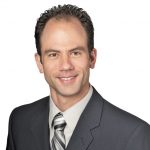

What Is a Resume Personal Statement?
Key elements of a strong resume personal statement, how to write a personal statement for a resume, professional personal statement examples for job applications, best practices for crafting the best personal statements for resumes, additional resources, frequently asked questions about crafting a professional personal statement.
Writing a personal statement for your resume can help recruiters and hiring managers get a better idea of who you are as a candidate and how your experience and achievements align with the company’s mission. Learn what to include and how to format this section in this personal statement writing guide.
A resume personal statement is a few short sentences at the top of your resume that provide an overview of your professional background and experience. It’s designed to create a strong first impression and catch the hiring manager’s attention quickly. This is important considering research shows most recruiters spend just seconds per resume on average.
A personal statement differs from a resume objective in that it focuses on showing the hiring manager why you’re a good fit for the company’s needs instead of talking about your personal career goals.
Clarity and conciseness
A personal statement should be brief — no more than two to four sentences. Space is at a premium on your resume, so convey your message as clearly as possible, and leave out unnecessary details. Fragment sentences are fine, as long as they are still cohesive and otherwise grammatically correct.
Relevance to the job role
Focus on your most relevant experience and qualifications in your personal statement, and tailor this section to each job. Look for keywords or must-have skills from the job description that you can include. For example, if the position requires a specific certification that you have, make sure this is included in the statement.
Highlights key skills and achievements
Resumes cover a lot of information in a small amount of space, and it’s easy for hiring managers to gloss over your contributions. Ensure they notice your most relevant skills and accomplishments by including them in the personal statement as well as a separate key skills list .
Start with a strong opening line
How to start a resume personal statement depends on the position, but begin strong with an opening line that grabs the recruiter’s attention and shows that you’re an immediate fit for the position. Include a key metric, such as how many years of experience you have, or a specific industry skill.
Focus on your most relevant skills and experience
Look through the required skills and experience in the job description, and pick the top three to five that match your professional background. Include these in your personal statement by tying them to career accomplishments or general strengths and proficiencies.
Include some personality
While a resume should always be a professional document, more employers are looking for candidates who are a good cultural fit for the company. Injecting a little personality into the personal statement by showing how your passions and aspirations align with the organization’s mission or goals can help you stand out.
Personal statement for entry-level job seekers
A 2023 marketing degree graduate specializing in social media strategy with internship and volunteer experience in multiple verticals. A proven track record of working with cross-functional teams to create multimedia content, manage social media calendars, and host live events across various social platforms to increase user engagement and support campaigns.
Personal statement for mid-level professionals
Dedicated and results-driven business analyst with over seven years of experience. Background in fuel-related systems optimization and renewable energy. Possesses a strong analytical mindset coupled with excellent interpersonal and communication skills. Leads cross-functional teams, conducts data analysis, and identifies opportunities for process enhancement.
Personal statement for senior-level and executive roles
A digital marketing director with over 10 years of experience defining marketing strategies for enterprise organizations. A proven track record of building high-performance marketing teams and collaborating with C-level executives. Adept at leveraging data-driven strategies to enhance market penetration and achieve positive business outcomes.
Personal statement for career changers
Experienced and dedicated technical support professional seeking to leverage skills in customer relations and product sales. Recognized for ability to find creative solutions and communicate complex instructions in a user-friendly manner. Adept with customer relationship management (CRM) software.
Tailor your statement for each application
Your resume should be customized for every job application you submit, and this includes your personal statement. Tweak the wording to reflect the keywords in the job description, and mirror the action verbs in the posting.
Keep it simple and straightforward
Your personal statement isn’t the place for industry jargon or overly complex language. While it’s fine to use key terms already present in the job description, stick with a clear, professional tone and easy-to-read language. Clear communication is an important skill for nearly every job, and your resume should reflect your abilities.
Proofread for clarity and accuracy
Just a few typos in your resume can dramatically reduce your chances of getting an interview . Always spend a few minutes checking your document for grammatical errors or inconsistencies before you hit the submit button. This is especially true for the personal statement because it’s the first section the hiring manager will read and is prone to errors when you’re adjusting it for each job.
Seek feedback
Ask a mentor or career advisor to take a look at your personal statement before you finalize it. They can help you identify confusing or vague words, suggest areas that could be more concise, and help you look for typos and other errors.
- Action Verbs, Power Words, and Strong Synonyms To Use on Your Resume
- Headline Examples for Your Resume
- How To Build a Professional Resume (Plus Examples and Templates)
- How To Write a Convincing Resume Profile
A personal statement is often also referred to as a resume summary . While the two are similar and almost interchangeable, there is one key difference. A resume summary pulls from your professional experience and skills to provide a two-second summary for the hiring manager.
Though a personal statement is formatted in the same way, there’s a little more leeway in what you can include. For example, a writer may add that they are passionate about the Oxford comma, and a French translator may indicate their love for classic French literature.
One of the best personal statement tips for job seekers is to use this section as part of your personal branding. Many applicants are likely to have a similar professional history or skills and qualifications, and it’s who you are as a whole candidate that can help you stand out.
The personal statement section is a place where you can immediately catch the hiring manager’s attention and give them something to remember you by, whether that’s being a Six Sigma Black Belt or having advanced Excel skills.
Your overall resume length should be between one and two pages, and your personal statement is a small fraction of that. In general, the personal statement should be about two to four sentences long, but depending on your resume formatting, it can be more helpful to measure it in lines of text. In most cases, it should be four to five lines at a maximum.
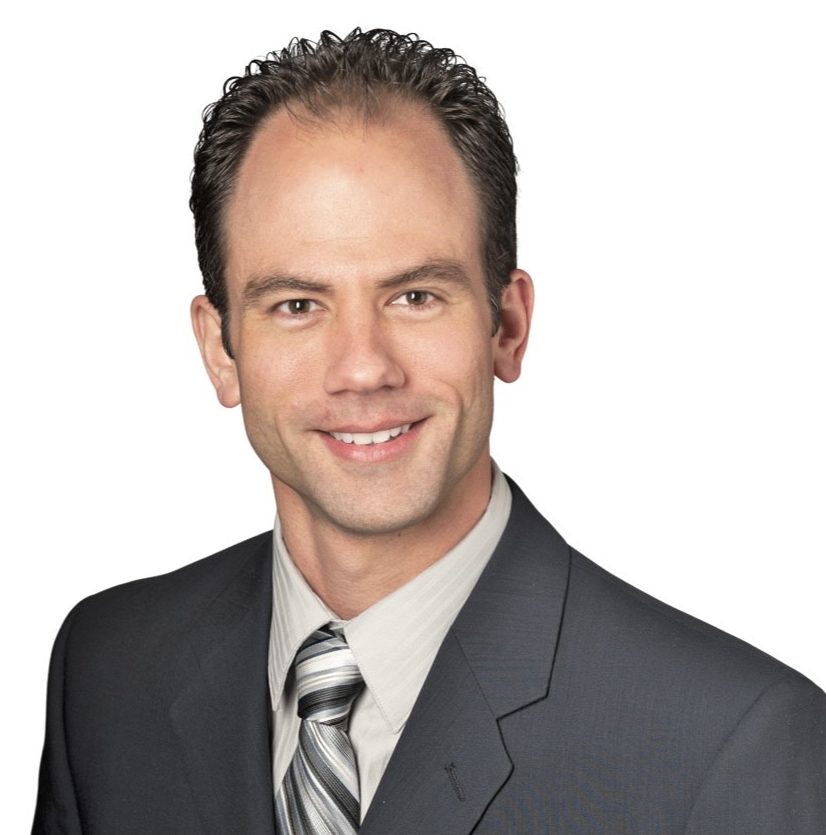
Executive Resume Writer and Career Coach
Andrew Stoner is an executive career coach and resume writer with 17 years of experience as a hiring manager and operations leader at two Fortune 500 Financial Services companies, and as the career services director at two major university business schools.
ResumeTemplates offers free, HR approved resume templates to help you create a professional resume in minutes. Choose from several template options and even pre-populate a resume from your profile.
Build a Resume to Enhance Your Career
Essential guides for your job search.
© 2024 Resumetemplates.com All rights reserved.

Personal Statement
Ai generator.
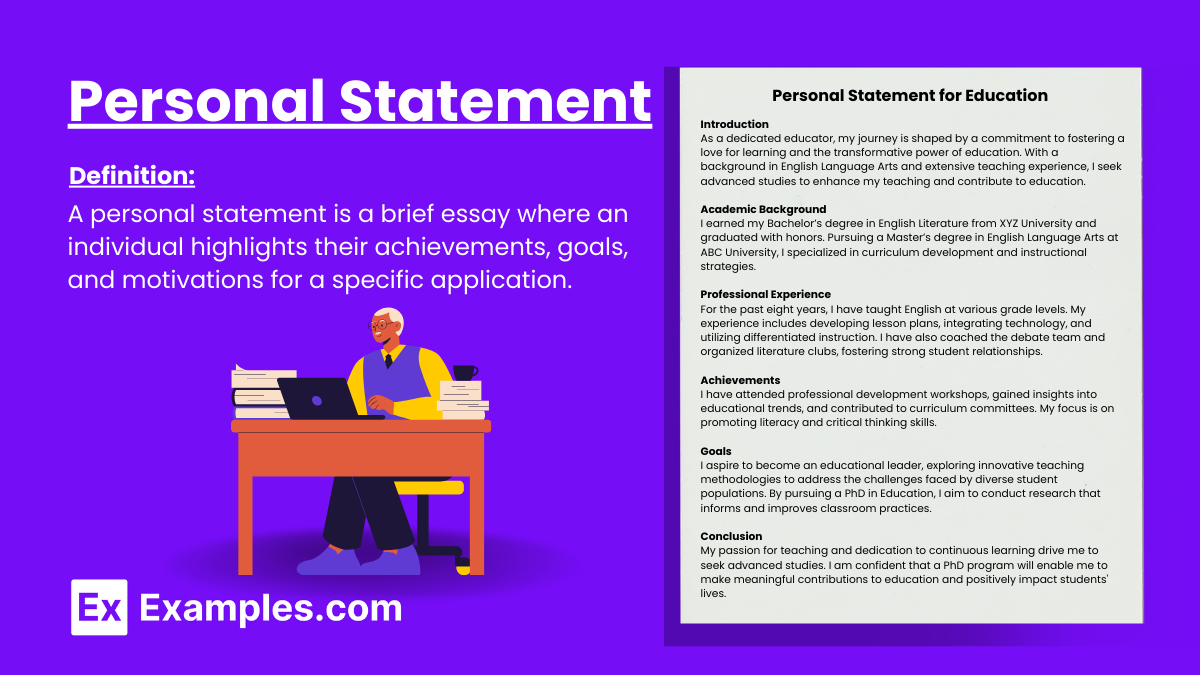
A personal statement is a vital component of college and job application . It showcases an individual’s unique experiences, skills , and aspirations, providing a narrative that highlights their strengths and goals. Crafting a compelling personal statement allows applicants to express their personality and motivations, helping them stand out in a competitive field. It’s an opportunity to reflect on past achievements and outline future ambitions, making a memorable impression on selection committees.
What Is a Personal Statement?
A personal statement is a crucial part of college and job applications, allowing individuals to highlight their unique experiences, skills, and aspirations. It serves as a narrative that showcases strengths and goals, helping applicants stand out. By reflecting on past achievements and outlining future ambitions, a well-crafted personal statement makes a lasting impression on selection committees.
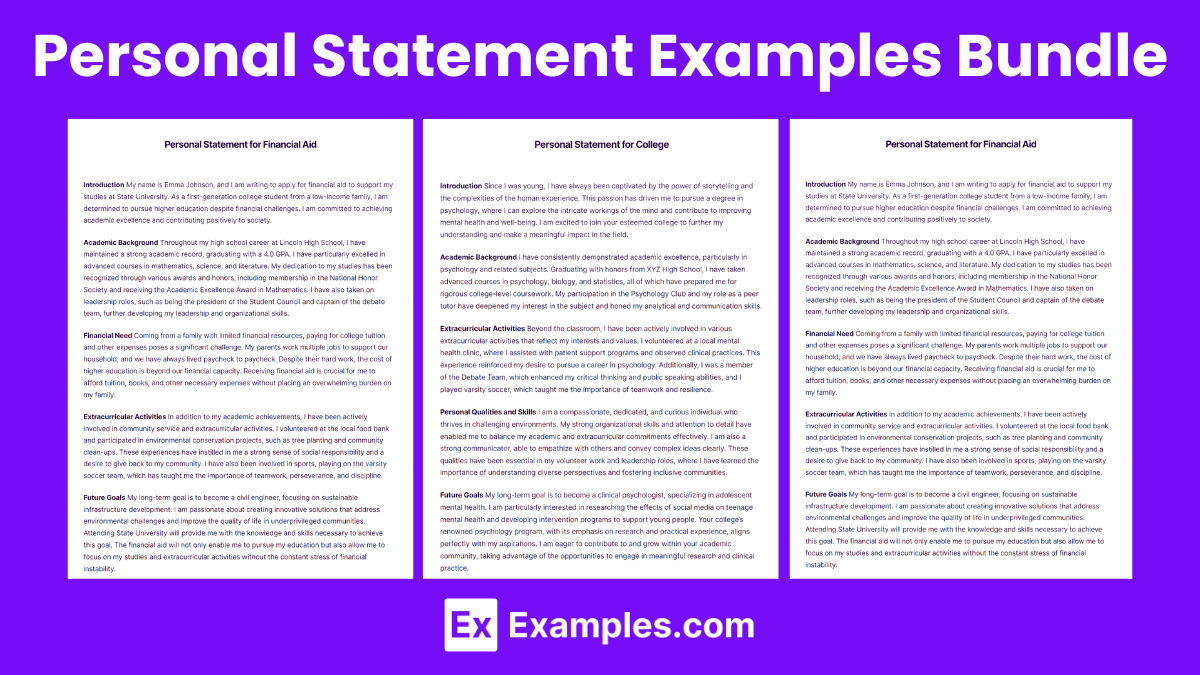
Download Personal Statement Bundle
Personal statement format
A personal statement is a crucial component of applications for college, graduate school, scholarships, or jobs. It is your opportunity to highlight your achievements, experiences, and goals. Here is a format for writing an effective personal statement:
- Begin with a strong opening sentence that grabs the reader’s attention.
- Introduce yourself and state the purpose of your personal statement.
- Mention what you are applying for (e.g., a specific program, scholarship, job).
- Discuss your academic achievements and experiences.
- Mention relevant courses, projects, or research that have prepared you for the program or job.
- Highlight any honors or awards you have received.
- Detail your work experience, internships, or volunteer work.
- Focus on experiences that are relevant to the program or position.
- Emphasize any skills or knowledge you have gained.
- Include any extracurricular activities, hobbies, or interests that demonstrate your well-rounded character.
- Mention leadership roles, community service, or other achievements.
- Show how these experiences have shaped you and your aspirations.
- Clearly state your short-term and long-term goals.
- Explain how the program or job aligns with your career aspirations.
- Describe what you hope to achieve and how you plan to contribute to the field.
- Summarize the key points you have made.
- Reiterate your enthusiasm and readiness for the program or position.
- Thank the reader for considering your application .
Example Personal Statement
Personal Statement for University Introduction : I am excited to apply for the Master’s program in Environmental Science at XYZ University. With a strong academic background in biology and a passion for environmental conservation, I am eager to contribute to cutting-edge research in sustainability and climate change mitigation. Academic Background : I graduated with honors from ABC University with a Bachelor’s degree in Biology. During my undergraduate studies, I completed a research project on the impact of urbanization on local wildlife, which sparked my interest in environmental science. I have taken courses in ecology, environmental policy, and data analysis, providing me with a solid foundation for advanced study. Professional Experience : Over the past two years, I have interned at the Green Earth Organization, where I assisted in conducting field surveys and analyzing data on endangered species. This experience has honed my skills in data collection, statistical analysis, and report writing. Additionally, I volunteered with Clean Water Initiative, where I led a team to organize community clean-up events and educate the public on water conservation. Personal Achievements and Extracurricular Activities : Outside of academics and professional work, I am an avid hiker and nature photographer. I have also been a member of the university’s environmental club, where I served as president and organized several successful campus-wide sustainability events. These activities have strengthened my leadership and teamwork skills. Goals and Aspirations : My short-term goal is to gain in-depth knowledge and research experience in environmental science through the Master’s program at XYZ University. In the long term, I aspire to work as an environmental consultant, helping businesses and communities implement sustainable practices. I am particularly interested in developing innovative solutions to reduce carbon footprints and protect natural habitats. Conclusion : In conclusion, I am confident that my academic background, professional experience, and passion for environmental conservation make me a strong candidate for the Master’s program in Environmental Science at XYZ University. I am eager to contribute to your esteemed program and am grateful for your consideration. Thank you for taking the time to review my application.
Personal Statement Examples
Personal statement for resume.
- Personal Statement for Job
Personal Statement for University
Personal statement for college, personal statement for financial aid.
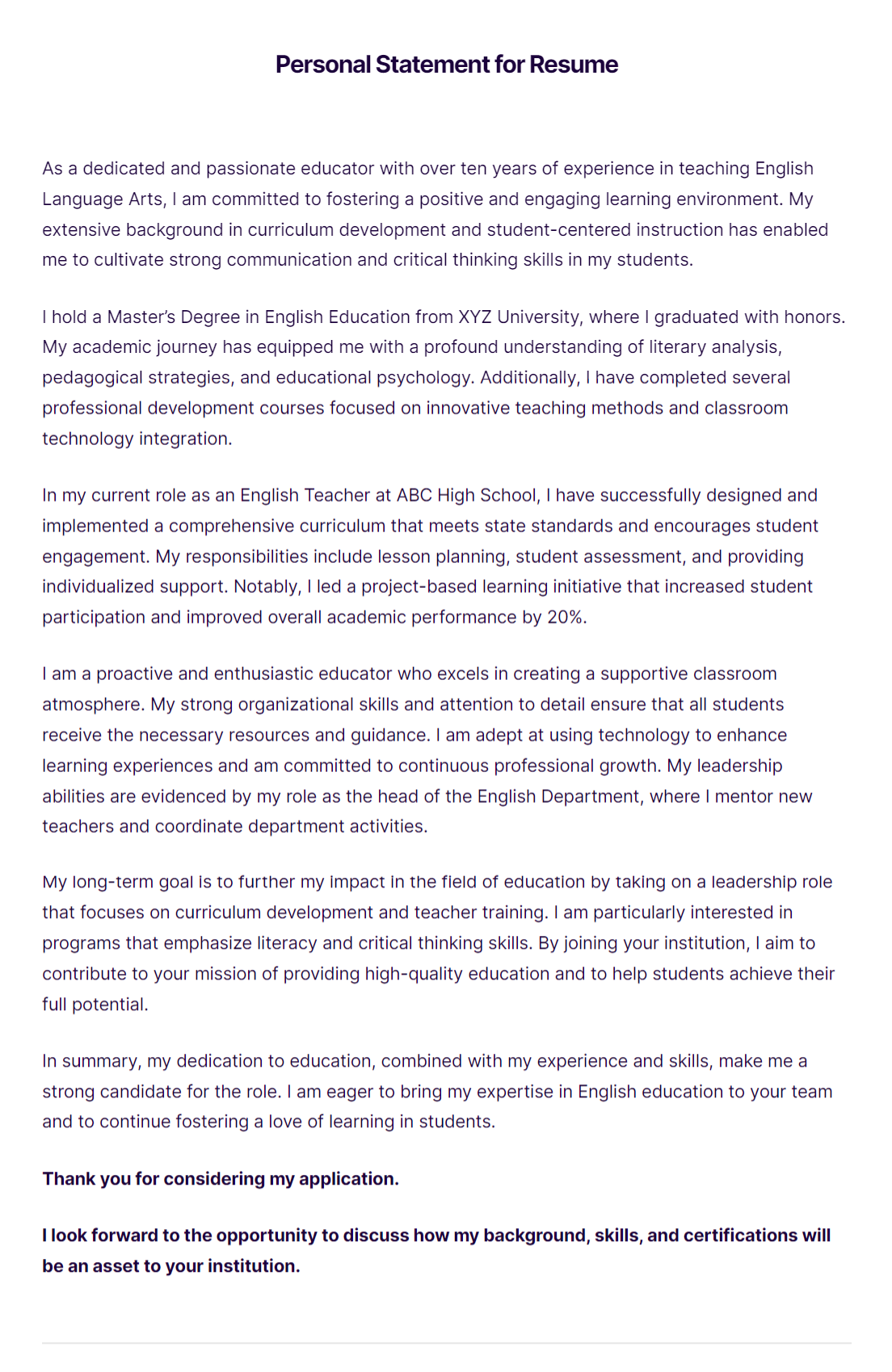
Personal Statement for Jobs
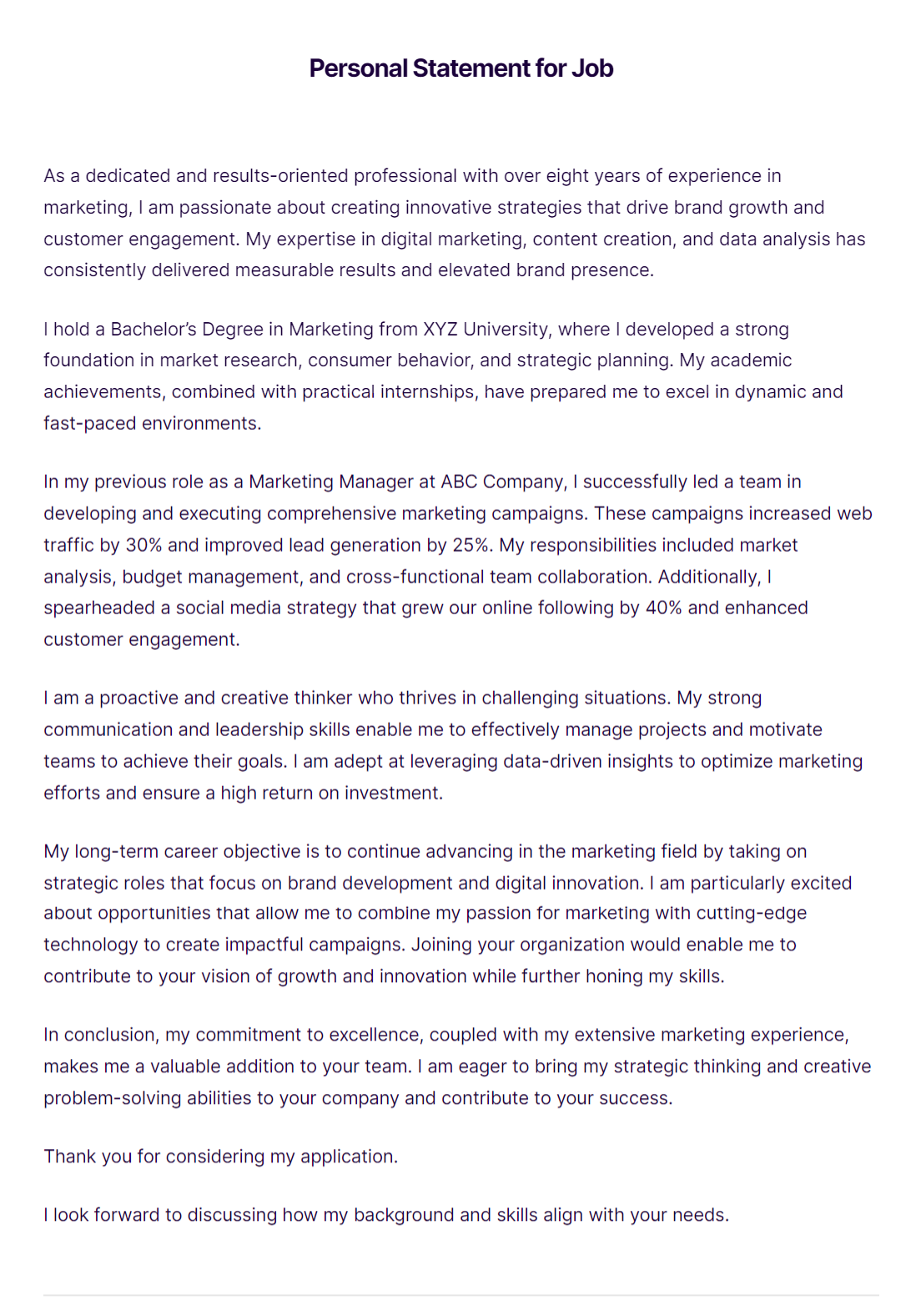
More Examples for Personal Statement
- Personal Statement Example for Medical School
- Personal Statement Example for Graduate School
- Personal Statement Example for Internship
- Personal Statement Example for Law School
- Personal Statement Example for CV
- personal statement Example for Research Internship
More Personal Statement Samples & Templates
1. personal statement affidavit template.
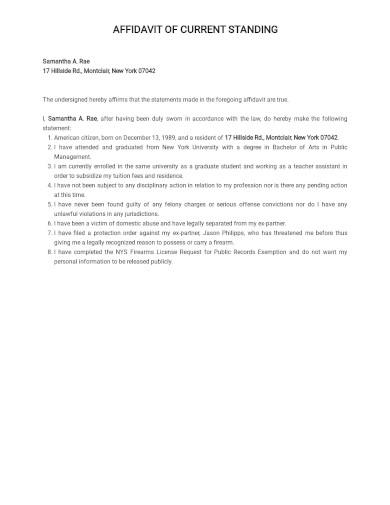
2. Freelance Personal Statement Template
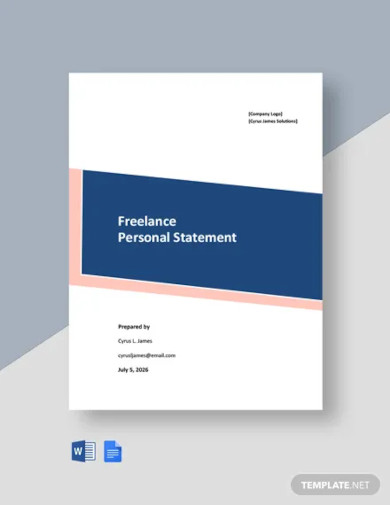
3. School Personal Statement Template
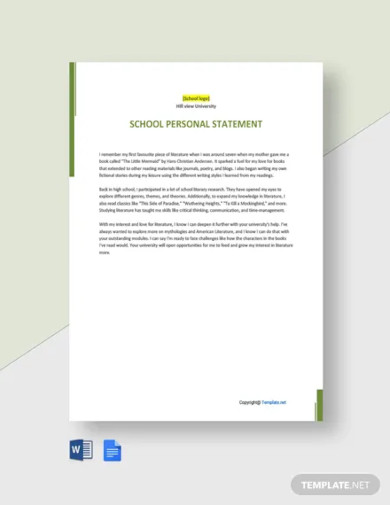
4. University Personal Statement Template
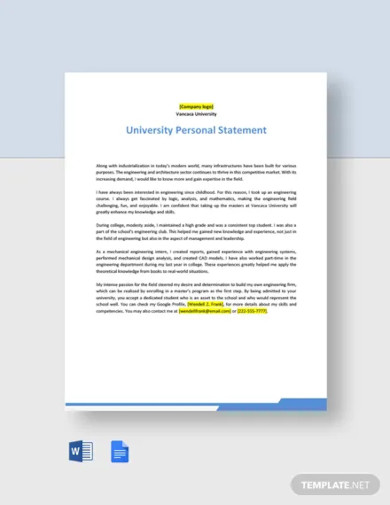
5. Medical School Personal Statement Template
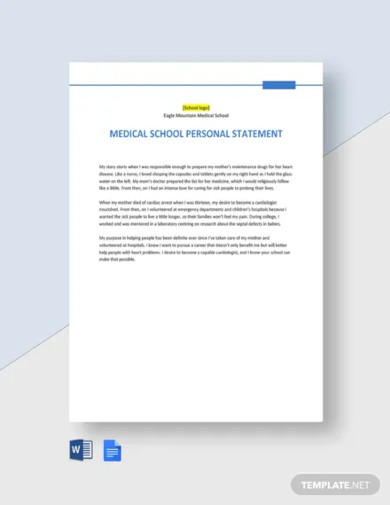
6. Law School Personal Statement Example
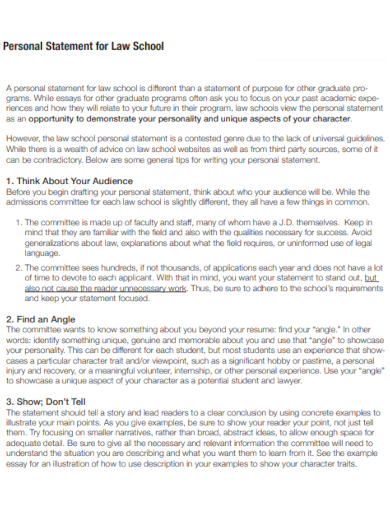
7. Engineering Master Personal Statement
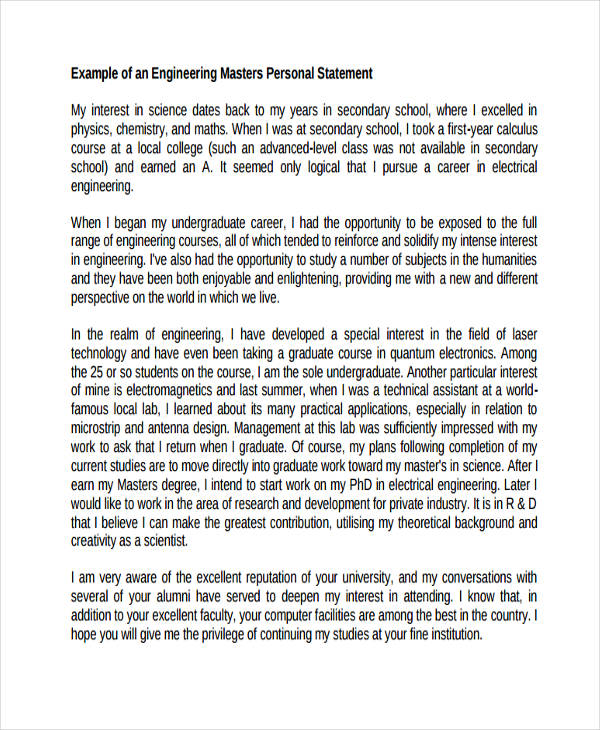

8. Civil Engineering Personal Statement
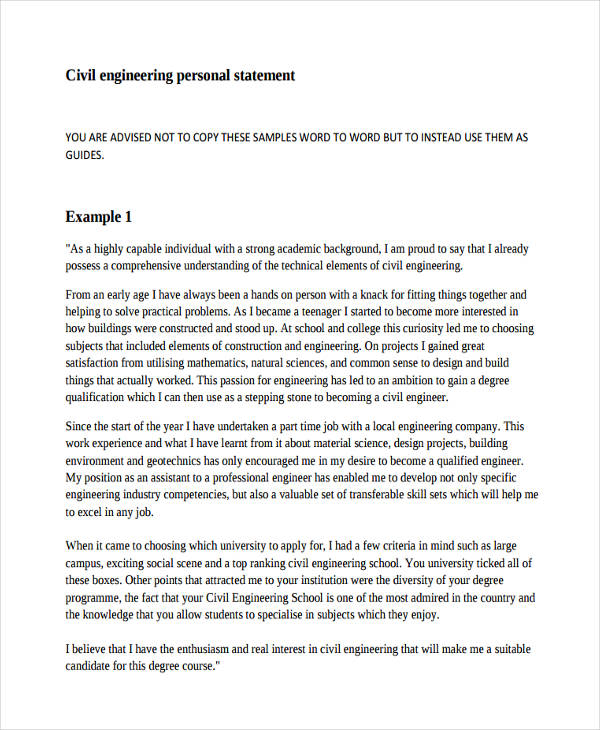
9. Mechanical Engineering Personal Statement
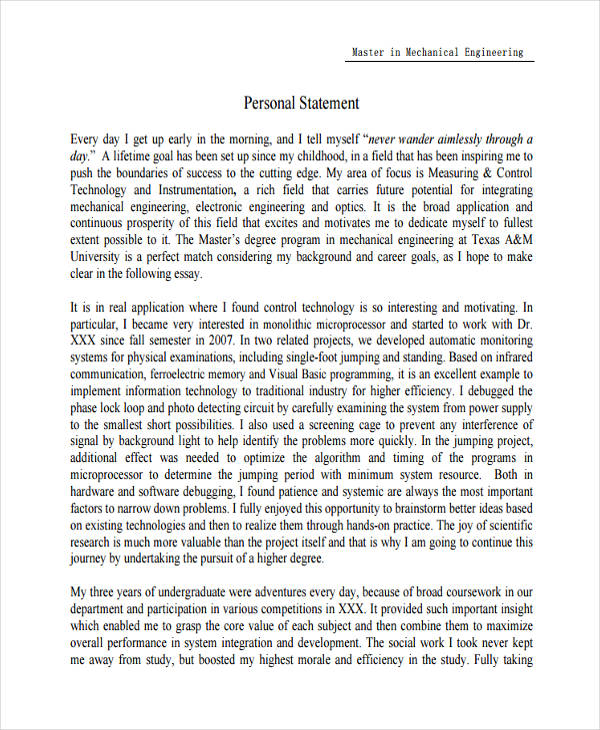
10. Law School Personal Statement
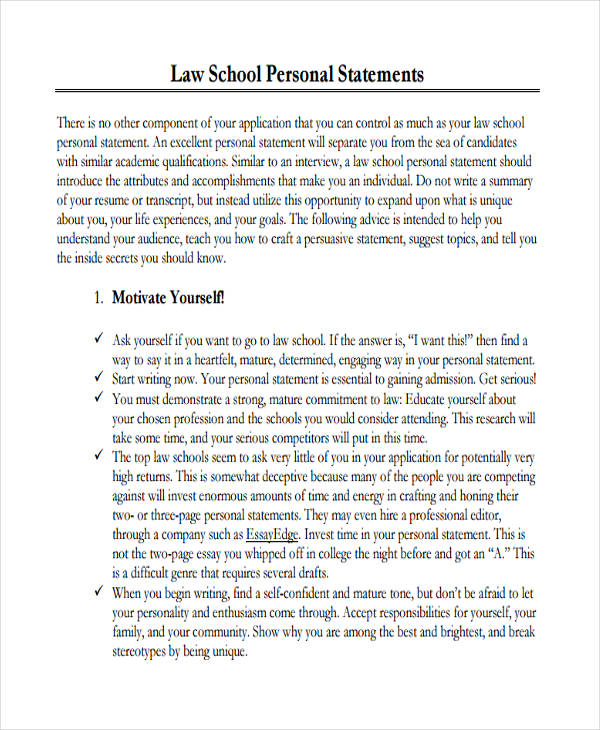
Tips for an Effective Personal Statement
When writing a personal statement, always bear in mind that you write to impress. So we have outlined for you some tips for an effective personal statement.
- Understand Your Goal. Bear in mind what your goal is in writing a personal statement . Remember that you are not the only one who is trying to grab that position or admission, so make it a point to put your best foot forward. This is what you do when you have a goal. It keeps your steps solid and for sure you won’t lose your track.
- Create an Outline. Like a college essay, your personal income statement should have a layout. Use the funneling technique on this one. Start from the most general points and narrow it down to the specific ones. It also helps you organize your thoughts better so your words will not jumble.
- Be Genuine. This is not the hardest thing to do in the world. All you need to do is tell honestly what your skills and accomplishments are. A personal statement is an overview about your personality. Even if it is a written letter, an employer or a supervisor will know if you are telling the truth or not.
- Be Specific. Some schools or business statement establishments would send a list of questions that they need you to answer and include on your personal statement. Answer those questions concretely and with substance. Do not veer away from your main point. Focus on your answer and be straightforward.
- Maintain a Positive Tone. A personal statement is not the place for you to vent out your frustrations in life nor an opportunity to show your weaknesses and appeal for emotions. Make your words sound positive. Provide energy and liveliness when sharing about a certain lesson you learned or an obstacle in your life and how you were able to overcome it.
- Check and Revise. Sometimes when we are writing, we often misspell things or use inappropriate words especially when we are in our deep thoughts. So before you put your letter in an envelope and put it in your mailbox, be sure to proofread your work. Check your spelling, choice of words and arrangement of thoughts.
How Important Is a Personal Statement?
University admissions hold interviews based on the applications they receive. How you write your personal vision statement will be a determining factor for you to land in an interview and consequently get into college. So if you are planning to write a personal letter of poor quality, you better think twice. Here are the reasons why you need to write a compelling personal letter.
1. It gives you a better shot.
Whether you are aiming for a university admission or landing a job at a prominent income statement for company , an effective personal letter gives you a better shot compared to others. Remember that you are not the only participant in the race. In order for you to win, you need to give it with an undivided attention.
2. It gets your name on the list.
Yes, it does. The truth is your personal letter is your only key to have your name on the master list. Some universities are a little picky when it comes to admitting new applicants. They do filtering to ensure that they choose the right students for the right program. Not only that. They are very selective because the applicant they choose will soon become a fruit of their own tree and they certainly don’t want it to be a bad one.
3. It boosts your confidence.
A personal statement is always given a head of time during an application examples or admission process. This gives the school or a company an overview of who to select from the many applicants. Writing a bold and convincing personal letter could get you ahead of others. You get picked from the basket of people longing for that post. Then in the process you get called for an interview.
You know that your personal statement caught the attention of the school board or the employer and so you are confident that you are just a few steps away from landing that position you always hoped for.
A personal statement need not be a novel-long narrative of yourself. Just as long as the important words and details are there, that’s fine. However, never settle for less. Always aim for the best. Have you ever seen an advertising brochure?
It usually comes as a single sheet example in pdf , a cardboard or a photo paper maybe, folded into half or a quarter, but contains all the necessary information you want to know about a certain product. That is how your personal statement should be, brief, concise, and effective.
What should be included in a Personal Statement
A personal statement is a critical component of many applications, providing an opportunity to showcase your qualifications, experiences, and motivations. Here is a comprehensive guide on what should be included in a personal statement:
1. Introduction
- Compelling Opening : Start with an engaging story, quote, or anecdote to capture the reader’s attention.
- Brief Overview : Introduce yourself and state your purpose for writing the personal statement. Mention the program or position you are applying for.
2. Academic Background
- Educational Qualifications : Detail your academic achievements, including your degree(s), GPA, and any honors or awards.
- Relevant Coursework : Highlight specific courses that are pertinent to the program or role.
- Research Projects or Theses : Discuss any significant research projects, theses, or academic papers, emphasizing their relevance to your field.
3. Professional Experience
- Internships and Jobs : Describe your professional experiences, focusing on internships, jobs, or volunteer work that relate to your application.
- Responsibilities and Achievements : Outline your roles, responsibilities, and key accomplishments in these positions.
- Skills Gained : Highlight the skills and knowledge you acquired, and how they prepared you for the role or program.
4. Personal Qualities and Skills
- Key Attributes : Mention personal qualities that make you a strong candidate, such as dedication, motivation, and resilience.
- Technical and Soft Skills : List relevant technical skills (e.g., programming languages, lab techniques) and soft skills (e.g., leadership, communication).
5. Motivations
- Passion for the Field : Explain why you are passionate about the field or profession. Share any personal experiences or events that sparked your interest.
- Career Aspirations : Discuss your long-term career goals and how the program or role fits into your career plan.
6. Future Goals
- Short-term Objectives : Describe what you hope to achieve in the immediate future, such as completing a degree or gaining specific experience.
- Long-term Vision : Outline your long-term professional aspirations and how the program or role will help you achieve them.
7. Conclusion
- Recap Main Points : Summarize the key points of your statement, reinforcing your enthusiasm and readiness for the opportunity.
- Thank You : Express gratitude for considering your application and indicate your eagerness to discuss your application further.
How to Write a Personal Statement.
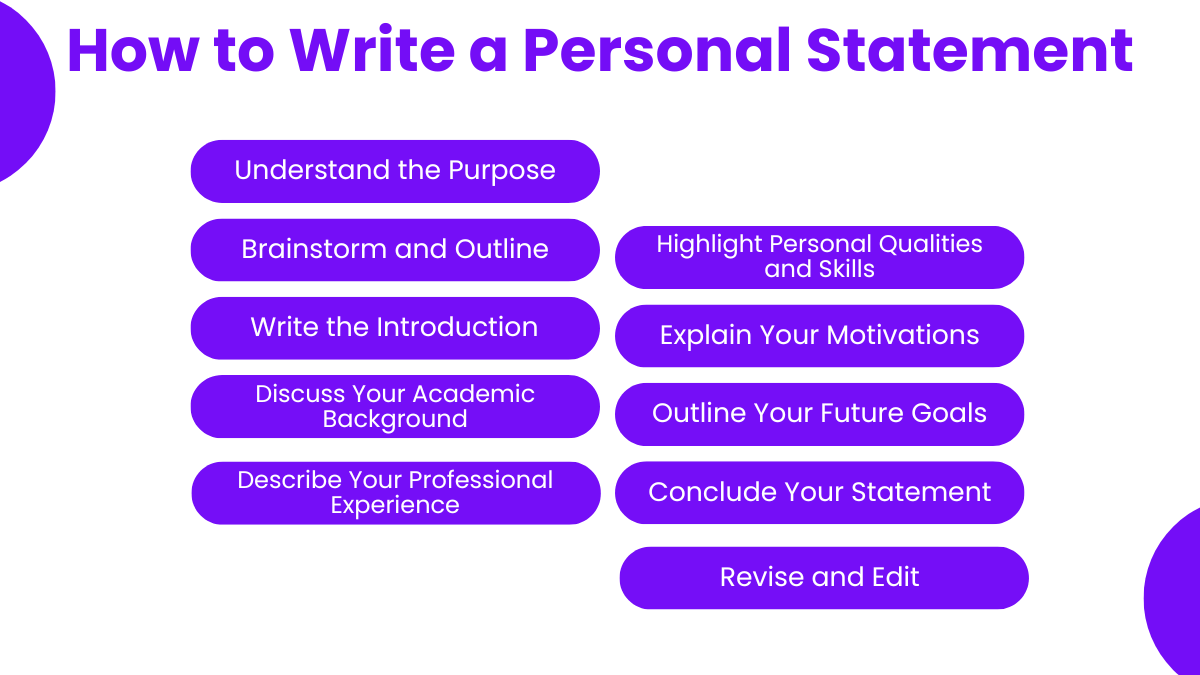
Writing a personal statement can be a challenging task, but it’s an essential part of many applications. Here’s a step-by-step guide to help you craft a compelling and effective personal statement:
Step 1: Understand the Purpose
- Purpose : A personal statement is a narrative that highlights your background, achievements, motivations, and goals. It aims to show why you are a suitable candidate for the program or position you are applying for.
- Audience : Consider who will be reading your statement and what they are looking for in a candidate. Tailor your content to meet their expectations.
Step 2: Brainstorm and Outline
- Self-Reflection : Think about your experiences, achievements, and goals. Identify key themes and stories that showcase your strengths and motivations.
- Outline : Create an outline to organize your thoughts. A typical personal statement includes an introduction, academic background, professional experience, personal qualities, motivations, future goals, and a conclusion.
Step 3: Write the Introduction
- Hook : Start with a compelling opening that grabs the reader’s attention. This could be a personal anecdote, a quote, or a unique experience related to your field.
- Overview : Briefly introduce yourself and state the purpose of your statement. Mention the program or position you are applying for.
Step 4: Discuss Your Academic Background
- Education : Detail your academic achievements, including your degree(s), GPA, and any honors or awards.
- Research Projects : Mention any significant research projects, theses, or academic papers, emphasizing their relevance to your field.
Step 5: Describe Your Professional Experience
Step 6: highlight personal qualities and skills, step 7: explain your motivations, step 8: outline your future goals, step 9: conclude your statement, step 10: revise and edit.
- Proofread : Carefully proofread your statement for grammar, spelling, and punctuation errors.
- Feedback : Seek feedback from mentors, professors, or colleagues to improve the clarity and impact of your statement.
- Polish : Make necessary revisions to ensure your statement is concise, coherent, and compelling.
What is a personal statement?
A personal statement is a written description of your achievements, skills, interests, and goals, typically used for university or job applications.
How long should a personal statement be?
Generally, a personal statement should be 500-800 words, but always check the specific guidelines of the application.
What should be included in a personal statement?
Include your introduction, academic background, professional experience, personal qualities, motivations, future goals, and conclusion.
How should I start my personal statement?
Start with a compelling hook, such as an anecdote, quote, or personal experience, to grab the reader’s attention.
How personal should my personal statement be?
Be personal enough to reflect your unique experiences and motivations but maintain a professional tone throughout.
Can I use the same personal statement for different applications?
Tailor each personal statement to the specific program or job to address their unique requirements and expectations.
Should I mention weaknesses in my personal statement?
If relevant, briefly mention weaknesses, but focus on how you have addressed and overcome them.
How do I make my personal statement stand out?
Highlight unique experiences, demonstrate passion for the field, and provide specific examples of your achievements and skills.
Is it okay to use quotes in a personal statement?
Yes, but use them sparingly and ensure they are relevant to your narrative and add value to your statement.
How do I conclude my personal statement?
Summarize your key points, reiterate your enthusiasm for the opportunity, and thank the reader for considering your application.
Text prompt
- Instructive
- Professional
10 Examples of Public speaking
20 Examples of Gas lighting

IMAGES
VIDEO
COMMENTS
A personal statement, also known as a ‘professional summary' or a 'CV summary', is one of the most important components of an application for universities or a job. Having an exceptional personal statement can increase your chances of being accepted or …
Your CV needs a strong personal statement. These 17 example CV personal statements and writing guide will show you how to create your own interview-winning CV and land the job you …
A personal statement is a short essay that provides a relevant autobiographical account of your qualifications. It serves as an opportunity to give an honest representation of …
Professional Personal Statement Examples for Job Applications . Personal statement for entry-level job seekers. A 2023 marketing degree graduate specializing in social …
In this article, we outline how to write a personal statement that is eye-catching in seven steps, and how to make your CV stand out from the crowd.
Crafting a winning personal statement will take time, especially if you haven’t written one before. Use these examples as a loose structure to follow, and you’ll be able to add to them as your …
Here is a format for writing an effective personal statement: Introduction. Begin with a strong opening sentence that grabs the reader’s attention. Introduce yourself and state the purpose of your personal …